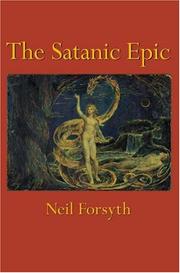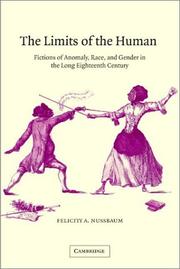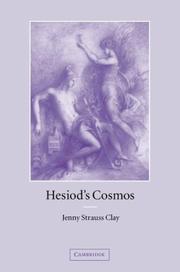| Listing 1 - 3 of 3 |
Sort by
|

ISBN: 0691113394 0691099960 9786612157691 1282157698 1400825237 9781400825233 9780691113395 9780691099965 9781282157699 6612157690 Year: 2003 Publisher: Princeton, N.J. : Princeton University Press,
Abstract | Keywords | Export | Availability | Bookmark
 Loading...
Loading...Choose an application
- Reference Manager
- EndNote
- RefWorks (Direct export to RefWorks)
The Satan of Paradise Lost has fascinated generations of readers. This book attempts to explain how and why Milton's Satan is so seductive. It reasserts the importance of Satan against those who would minimize the poem's sympathy for the devil and thereby make Milton orthodox. Neil Forsyth argues that William Blake got it right when he called Milton a true poet because he was "of the Devils party" even though he set out "to justify the ways of God to men." In seeking to learn why Satan is so alluring, Forsyth ranges over diverse topics--from the origins of evil and the relevance of witchcraft to the status of the poetic narrator, the epic tradition, the nature of love between the sexes, and seventeenth-century astronomy. He considers each of these as Milton introduces them: as Satanic subjects. Satan emerges as the main challenge to Christian belief. It is Satan who questions and wonders and denounces. He is the great doubter who gives voice to many of the arguments that Christianity has provoked from within and without. And by rooting his Satanic reading of Paradise Lost in Biblical and other sources, Forsyth retrieves not only an attractive and heroic Satan but a Milton whose heretical energies are embodied in a Satanic character with a life of his own.
Christian poetry, English --- Devil in literature. --- Epic poetry, English --- Evil in literature. --- Fall of man in literature. --- History and criticism. --- 820 "16" MILTON, JOHN --- -Evil in literature --- -English Christian poetry --- English epic poetry --- Engelse literatuur--17e eeuw. Periode 1600-1699--MILTON, JOHN --- -Engelse literatuur--17e eeuw. Periode 1600-1699--MILTON, JOHN --- 820 "16" MILTON, JOHN Engelse literatuur--17e eeuw. Periode 1600-1699--MILTON, JOHN --- -820 "16" MILTON, JOHN Engelse literatuur--17e eeuw. Periode 1600-1699--MILTON, JOHN --- Devil. --- Evil in literature --- Good in literature --- Milton, John, --- Rubinstein, Anton, --- Characters --- Devil in literature --- Fall of man in literature --- History and criticism --- Milton, John --- Milṭan, Jān, --- Milʹton, Dzhon, --- Милтон, Джон, --- Miltūn, Zhūn, --- Miltonus, Joannes, --- J. M. --- M., J. --- Milʹton, Īoann, --- Milton, Gioanni, --- Milton, Giovanni, --- מילטאן, יאהאן --- מילטאן, יוחנן --- מילטון, ג׳והן --- מלטן, יוחנן --- Good and evil in literature.

ISBN: 0521016428 9780521016421 0521811678 9780521811675 Year: 2003 Publisher: Cambridge Cambridge Univ. Press
Abstract | Keywords | Export | Availability | Bookmark
 Loading...
Loading...Choose an application
- Reference Manager
- EndNote
- RefWorks (Direct export to RefWorks)
"Felicity Nussbaum examines literary and cultural representation of human difference in England and its empire during the long eighteenth century. With a special focus on women's writing, she analyzes canonical and lesser-known novels and plays from the Restoration to abolition. She considers a range of anomalies (defects, disease, and disability) as they intermingle with ideas of a racial femininity and masculinity to define "normalcy" as national identity. Incorporating writings by Behn, Burney, and the Bluestockings - as well as Southerne, Shaftesbury, Johnson, Sterne, and Equiano - Nussbaum treats a range of disabilities - being mute, blind, lame - and physical oddities such as eunuchism and giantism. She shows that these corporeal features, perceived as aberrant and extraordinary, combine in the popular imagination to reveal a repertory of differences located between the extremes of splendid and horrid novelty."--Jacket.
Abnormalities, Human, in literature. --- Anomalie. --- Difference (Psychology) in literature. --- Engels. --- Englisch. --- English literature --- English literature. --- Gender identity in literature. --- Geschlecht. --- Human beings in literature. --- Individuele verschillen. --- Letterkunde. --- Literatur. --- Race in literature. --- Rasse. --- Rassen (mens). --- Sekserol. --- Sex role in literature. --- Women and literature --- Women and literature. --- History and criticism --- History --- 1700-1799. --- Geschichte 1700-1800. --- Great Britain. --- Abnormalities, Human, in literature --- Difference (Psychology) in literature --- Gender identity in literature --- Human beings in literature --- Race in literature --- Sex role in literature --- Man in literature

ISBN: 1107137071 128043659X 0511180926 0511062141 0511205074 051130787X 0511482396 0511070608 9780511062148 9780511070600 9780521823920 0521823927 9781280436598 9780511307874 9786610436590 6610436592 9780511482397 9780521117685 0521117682 9781107137073 9780511180927 9780511205071 Year: 2003 Publisher: Cambridge, U.K. ; New York : Cambridge University Press,
Abstract | Keywords | Export | Availability | Bookmark
 Loading...
Loading...Choose an application
- Reference Manager
- EndNote
- RefWorks (Direct export to RefWorks)
Hesiod's Cosmos offers a comprehensive interpretation of both the Theogony and the Works and Days and demonstrates how the two Hesiodic poems must be read together as two halves of an integrated whole embracing both the divine and the human cosmos. After first offering a survey of the structure of both poems, Professor Clay reveals their mutually illuminating unity by offering detailed analyses of their respective poems, their teachings on the origins of the human race and the two versions of the Prometheus myth. She then examines the role of human beings in the Theogony and the role of the gods in the Works and Days, as well as the position of the hybrid figures of monsters and heroes within the Hesiodic cosmos and in relation to the Hesiodic Catalogue of Women.
Religious poetry, Greek --- Didactic poetry, Greek --- Cosmology, Ancient, in literature. --- Mythology, Greek, in literature. --- Human beings in literature. --- Gods, Greek, in literature. --- Monsters in literature. --- Man in literature --- Greek religious poetry --- Greek poetry --- History and criticism. --- Hesiod. --- Hesiod --- Gesiod --- Geziod --- Esiodo --- Hēsiodos --- Hezjod --- Hésiode --- Hesíodo --- Hesiyodos --- הסיודוס --- Ἡσίοδος --- Knowledge --- Cosmology. --- Cosmology, Ancient, in literature --- Gods, Greek, in literature --- Human beings in literature --- Monsters in literature --- Mythology, Greek, in literature --- History and criticism --- Hesiodus --- Cosmology --- Religious poetry [Greek ] --- Didactic poetry [Greek ] --- Cosmology [Ancient ] in literature --- Mythology [Greek ] in literature --- Gods [Greek ] in literature --- Alceste (Mythologie grecque) dans la littérature. --- Cosmologie antique dans la littérature. --- Didactic poetry, Greek. --- Dieux grecs dans la littérature. --- Homme dans la littérature. --- Kosmologie. --- Literatura grega. --- Monstres dans la littérature. --- Poésie didactique grecque --- Poésie religieuse --- Religious poetry, Greek. --- Wereldbeeld. --- Histoire et critique. --- Hesiodus, --- Hésiode --- Hésiode. --- Hesiodo. --- Hesiodus. --- Et la cosmologie. --- Theogony (Hesiod). --- Works and days (Hesiod). --- Arts and Humanities --- History --- Religious poetry, Greek - History and criticism --- Didactic poetry, Greek - History and criticism --- Hesiod - Theogony --- Hesiod - Works and days --- Hesiod - Knowledge - Cosmology
| Listing 1 - 3 of 3 |
Sort by
|

 Search
Search Feedback
Feedback About UniCat
About UniCat  Help
Help News
News